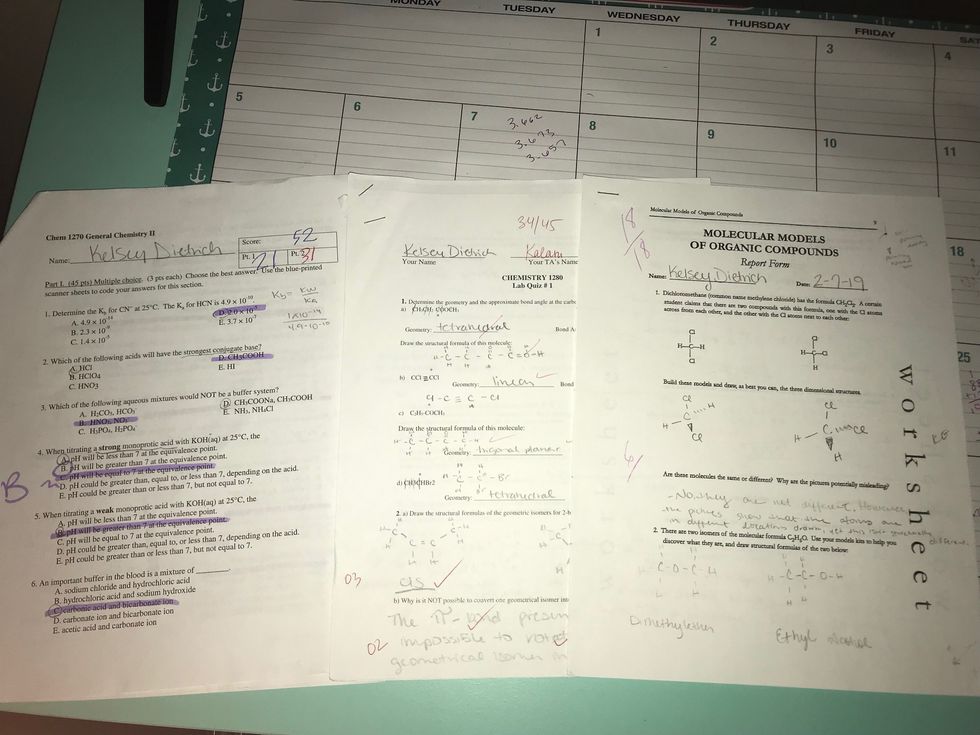College can be overwhelming when you are always striving for the top grades. A lot of things depend on your grade point average including scholarships, membership eligibility for organizations, graduating with honors, and your sanity.
Oh, your sanity...
As important as scholarships, membership eligibility for organizations, and graduating with honors may be, your mental health tops them all (and probably even when compared to the combination of the importance of all the other priorities).
It can be really startling to have this thought, society seems to prioritize people who are good at everything all of the time. The reality is, nobody is good at everything all of the time, every individual has their strengths and weaknesses and these aspects are readily emerging while in college. While this is a time for students to explore and specialize in areas of study, this is also a time for trial and error.
And there are probably going to more errors than you could have ever anticipated. Ever.
With those errors, come low grades. It is the most frustrating thing to have truly completed all of the required readings, homework assignments, office hours, tutoring sessions, plus studying for the exam, and then. you still don't end up a satisfactory grade in the class. Some subject areas just come more naturally to some students compared to others. Oftentimes, the undergraduate college curriculum requires a multidisciplinary approach where students are exposed to a plethora of notions, theorems, and worldviews based on a wide range of classes. It is impossible to be excellent at all of these different ways of thinking. Moreover, each college class is run differently by a very unique professor. The grades are weighted differently in sections of classes that are taught by different professors based solely on the preference of the professor, despite if, the name of the class on the transcript is identical. In addition, the requirements to achieve a certain letter grade is different for each class once again if it is the same class just another section taught by a different professor.
For example, the critical thinking course I took my freshman year involved an in-class, 10-hour final exam. There were several other sections of critical thinking all taught by different professors in different departments. Some of these other sections of the critical thinking class included other ways to challenge students including the typical in-class exam during finals week that composed a fifth of your total grade, a take-home final exam, an in-class open-note exam, an online timed questionnaire, a final essay, or a group research project. As you can see, there are so many options that professors use for a final examination, and there is even more variability between the methods and types of questions asked or the skills required for these tests. Moreover, students have no idea what method their professors are going to adhere to.
Consequently, with all of the classes that are included in the undergraduate curriculum, it is very possible that a student will be exposed at least all of these testing methods (and probably some other unique ones that I have failed to include in this article) at various points in their career. There will be times when you don't score as high as you would have liked when you are being tested in a way that deviates from the standard testing method we have grown up with. And let me tell you, that is perfectly OK.
As long as you tried your best when faced with the new challenge of a college class either in a subject area you have little knowledge of or lack a motivated interest in learning about, then that's all that matters.
As long as you tried your best when faced with the new challenge of a college class taught by a professor that you cannot help but loathe, even though you would rather not, then that's all that matters.
As long as you tried your best when faced with the new challenge of a college class that you know will have no effect on your future studies or career, then that's all that matters.
As long as you tried your best when faced with the new challenge of a college class that your final grade is much lower than you feel you actually earned, then that's all that matters.
At the time being, the unexpected grade is not something worth celebrating and it probably feels like you will never get over it. As an undergrad, grades feel like the entire world because our primary job is most likely being a student. Yet, in reality, grades are really meaningless. Of course, grades are associated with a lot of things that we worry we will lose if let our GPAs go, but a couple lower than average grades here and there will not kill us and it is certainly not worth getting completely upset about.
Grades do not measure your true talents.


















